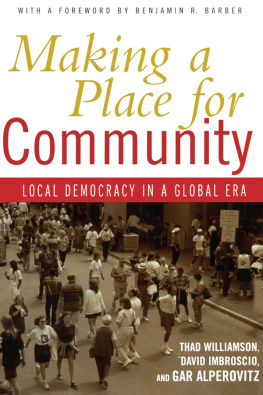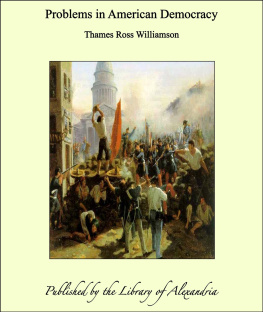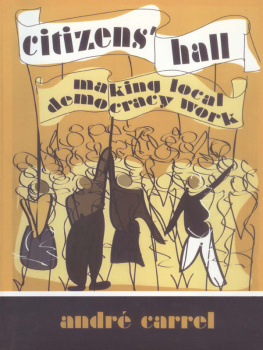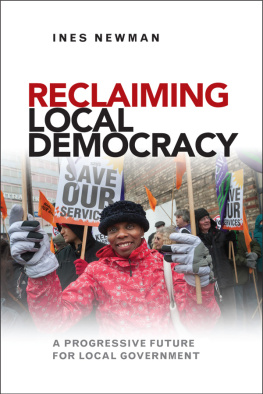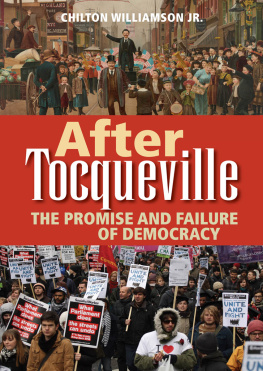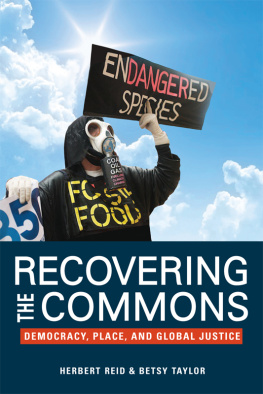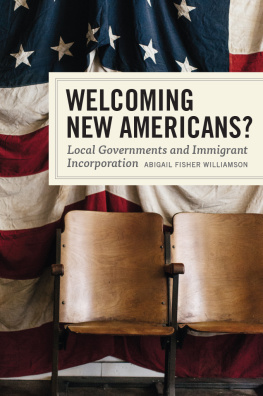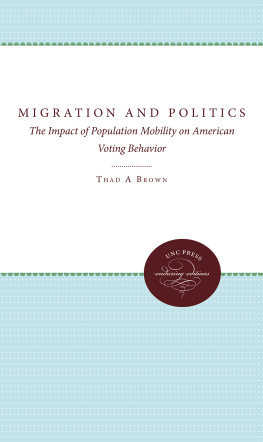First published in 2002 by
Routledge
711 Third Avenue
New York, NY 10017
Published in Great Britain by
Routledge
2 Park Square, Milton Park
Abingdon, Oxon OX14 4RN
Copyright 2002 by Taylor & Francis Group
Routledge is an imprint of the Taylor & Francis Group, an informa business
All rights reserved. No part of this book may be reprinted or reproduced or utilized in any form or by any electronic, mechanical or other means, now known or hereafter invented, including photocopying and recording or in any information storage or retrieval system, without permission in writing from the publisher.
Library of Congress Cataloguing-in-Publication Data
Williamson, Thad.
Making a place for community: local democracy in a global era / by Thad Williamson, David
Imbroscio, and Gar Alperovitz; with a foreword by Benjamin Barber,
p. cm
Includes bibliographical references and index.
ISBN 0-415-93356-0
1. Community development, UrbanUnited States. 2. Community lifeUnited States. 3. United StatesEconomic conditions. 4. Urban economics. 5. Globalization. I. Imbroscio, David. II. Alperovitz, Gar. III. Title.
HN90.c6 W4665 2002
| 307.1410973dc21 | 2001058939 |
We would like to thank the following individuals for their support, help, advice, and criticism. (All errors, of course, are our own.) Alex Campbell, James DeFilippis, Christopher Gunn, Avery Kolers, Christopher Mackin, Rodger Payne, Loren Rodgers, Adria Scharf, Todd Swanstrom, and Jordan Yin were kind enough to read and comment on all or parts of the manuscript. Numerous individuals contributed research, background materials, and other assistance. We would especially like to thank: Matt Berres, Laura Brandt, Jonas Brodin, Wen-Heng Chou, Stephanie Geller, Ted Howard, Michael Jones, Alexandra Kogl, Brendan Leary, Evan Lewis, Byron Lutz, Kathleen Pleasant, Jeff Pope, Preston Quesenberry, Tom Ricker, Jennifer Thangevalu, Matt Weiss, and Donn Worgs. Dwight Haygood and especially Joshua Harris did much of the work of pulling together the appendix. Several passages in drew heavily from The Emerging New Society by our colleague Kristen Rusch.
David Imbroscio would also like to thank the College of Arts and Sciences, University of Louisville, the Office of the Vice President for Research, University of Louisville, and Charles Ziegler, Chair of the Department of Political Science, University of Louisville, for supporting his contributions to this project. Thad Williamson acknowledges the support received from the Multidisciplinary Program on Inequality at the Kennedy School of Government; this work benefits greatly from his opportunity to learn from and work with, in particular, Professors Ronald Ferguson, Christopher Jencks, Robert Putnam, and Michael Sandel at Harvard.
The University of Maryland and its faculty have directly and indirectly contributed to the success of this project in many ways. In particular Gar Alperovitz would like to thank the principals and staff of the Civil Society/Community Building Initiative and the Democracy Collaborative. Special thanks to Benjamin Barber for his generous foreword and to Stewart Edelstein, Stephen Elkin, Jessica Gordon Nembhard, and Jon Wilkenfeld for specific contributions and general support of the overall effort.
We gratefully acknowledge the support of the Ford Foundation, the Surdna Foundation, and the Rockefeller Foundation. Related research that contributed to this project was supported by the Annie E. Casey Foundation, the Bauman Foundation, the Cummings Foundation, the John D. and Catherine T. MacArthur Foundation, and the Summit Foundation. Special thanks to Patricia Bauman, John Bryant, Betsy Campbell, Bob Giloth, Charles Halpern, Frances Korten, Lance Lindblom, Julia Lopez, Susan Sechler, and Edward Skloot for their friendship, support, and input.
Our appreciation to editor Eric Nelson at Routledge for his patience and enthusiasm and production editor Nicole Ellis for her hard work with the manuscript.
Special thanks to Ronald Goldfarb for invaluable advice and help.
Finally, thanks to Sharon Alperovitz and Adria Scharf for their patience, love, and support.
BY BENJAMIN R. BARBER
Democracy, community, place, and work are interdependent terms. From Jean-Jacques Rousseau and Alexis de Tocqueville to Robert Bellah and Robert Putnam, a powerful tradition of social thought has insisted that stable democracies must be grounded in strong communities, which are themselves firmly rooted in civil society. As a consequence, in recent decades the challenges facing democracy have been captured by terms such as decline of social capital and erosion of civic trust. Politics has been reconceptualized in the language of society and citizenship, as political science has been yielding to the powerful analysis of sociology (Bellah is a sociologist, as are influential scholars of Americas political sociology such as Seymour Martin Lipset). In the same vein, liberal communitarians such as Michael Sandel, Mary Ann Glendon, and Amitai Etzioni have labored to remind us that individualshowever abstract they may become when regarded as bundles of rightsare in reality embedded in families and associations and generally flourish only as the communities to which they belong flourish. Thus has democratic theory enlarged its dominion from mere state theory to social theory. Thus has politics been rethought in the language of the civic and the social.
As sociological and communitarian analysis has prospered, however, the once fashionable perspective of political economy has wilted. Whether because of Marxism's practical fall from grace with the collapse of the Soviet empire or the rising hegemony of neoliberal theory that accompanied and succeeded it, far less thought has been given in recent decades than previously to how the economy interacts with the twin terms community and democracy. Although neoliberalism treats the economy as trump, it focuses on economics as an independent, indeed autonomous variable that supplants rather than interacts with politics and society. This new study is thus especially welcome, for it not only refurbishes the perspective of political economy for this new age of globalization but does so not at the expense of the communitarian point of view but by offering vital linkages between politics, community, and the economy. Rather than drawing new boundaries, it builds new bridges across old theoretical divides. Neoliberalism has not so much forged as denied linkages, arguing that a laissez-faire free market system is more or less the same thing as democracythis despite the fact that as ardent an advocate of markets as Charles Lindblom has observed that there is no convincing evidence or argument that, except in the mind, the market system is necessary to democracy. Indeed, if community stability is a primary condition of democracy, then it may be that the market system is destabilizing rather than nurturing to democracy. Rousseau seemed closer to the mark when he suggested that a pastoral economy, simple economic interests, and frugality helped underwrite the operation of the general will, and alone could sustain democracy in the strong sense. Even leaving aside the Marxist tradition, social theorists and philosophers from Tocqueville to Dewey have wondered whether entrepreneurial capitalism is more likely to undercut than to sustain democratic community.


